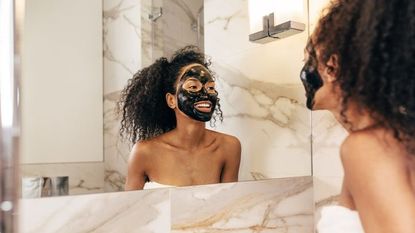
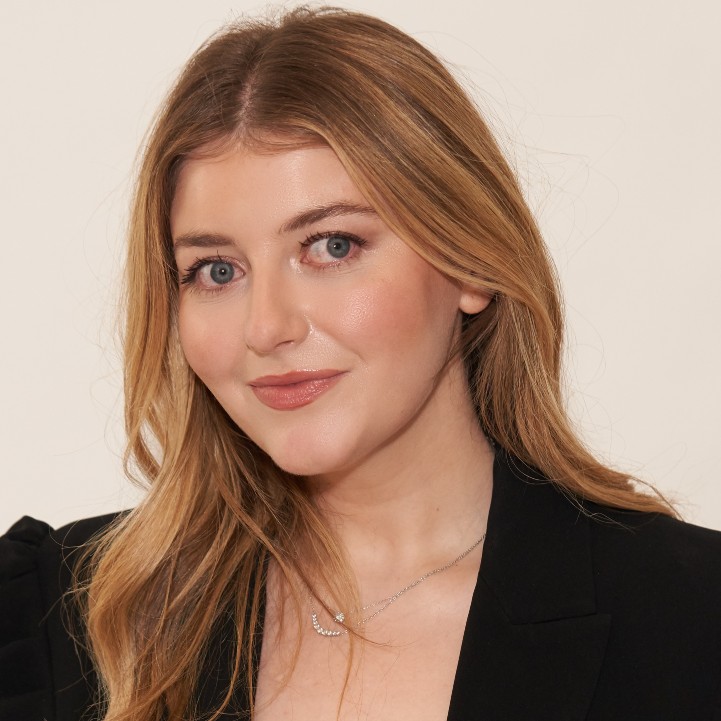
If blackheads, large pores, and a wildly oily, borderline slippery complexion tops your list of skin concerns, it’s due time to take a *really* close look at your skincare routine. Blackhead removers might be able to de-gunk your T-zone and it’s possible a well-vetted pore vacuum can just suck the pus out of those nasty whiteheads. But when it comes to a do-it-all solve? The best clay masks reign supreme—they’re the MVPs for oily and acne-prone skin. “Clay masks are known for their oil-absorbing qualities, which makes them helpful in both removing excess grease from the skin’s surface and giving the skin a matte texture,” explains board-certified dermatologist Dr. Viktoryia Kazlouskaya. “They also have an anti-inflammatory effect and may be used for acne-prone skin.”
The power of this kind of face mask lies in its ingredients. Some heavy duty options will be loaded with various clays that quite literally extracts the dead skin cells and grease out of your face. Others will be infused with salicylic acid to fight blackheads, while some will have a touch of glycerin to amp up hydration. The moral of the clay mask story: There’s something for everyone. And to help make picking the best option for you a heck of a lot easier, we’ve rounded up the best clay masks for every skin type and concern, ahead.
Should I Use a Clay Mask?
Clay masks are going to be best for oily and acne-prone skin. That shouldn’t come as too much of a surprise given their job is quite literally to remove oil and reduce the look of large pores. That said, other skin types may want to proceed *extra* carefully. “Clay masks may slightly dry the skin out, therefore people with dry and sensitive skin should use them with caution,” says Dr. Kazlouskaya.
That said, clay masks are by no means off limits to sensitive skin types. "Even sensitive skinned patients can benefit from the benefit of a clay mask formulated for sensitive skin," notes Dr. Lian Mack, board-certified dermatologist and founder of GlamDerm. "However, this is where it becomes important to check ingredients. For example, if you are sensitive and are prone to redness or rosacea consider looking for a clay mask compounded with gentle ingredients like niacinamide, chamomile and aloe."
What to Look For
Charcoal, kaolin clay, or bentonite are typically going to be the baseline for a clay mask. They’re the foundation and you’ll probably find at least one, if not a combination of ‘em, on the INCI list. But everything that comes after the base is what’s really important. "The ingredients that you look for in a clay mask depend on your skin and its needs," explains Dr. Mack. For example, if you need a little extra moisture, Dr. Kazlouskaya recommends looking for glycerin, petrolatum, or panthenol. Want to reduce inflammation and amp up antioxidant protection? Search out ingredients like green tea or jojoba oil. And if exfoliating dead skin cells is your main concern, then salicylic acid is going to be your BFF.
How Often to Use a Clay Mask
There’s no cut-and-dry formula on how frequently you should use a clay mask—it honestly is up to you. Just listen to your skin and don’t overdo it. As a rule of thumb, one time a week is going to be plenty. "Clay has a natural exfoliative property. In addition, most clay masks are made with other active ingredients like alpha hydroxy and beta hydroxy acids. Too much exfoliation can lead to a rash or irritant contact dermatitis," explains Dr. Mack. "Moreover, clay helps to minimize oil or sebum production and if you are not naturally oily, the drying effect of clay may over-dry you, creating an eczema-like reaction in the skin."
The Best Clay Masks
- The Best Drugstore Clay Mask: Cetaphil Dermacontrol Purifying Clay Mask
- The Best Clay Mask for Large Pores: Aztec Secret Indian Healing Clay
- The Best Clay Mask for Oily Skin: Caudalie Vinopure Purifying Clay Mask
- The Best Clay Mask for Acne: Youth to the People Superclay Purify + Clear Power Mask With Niacinamide
- The Best Clay Mask for Dry Skin: Erno Laszlo Pore Cleanse Clay Mask
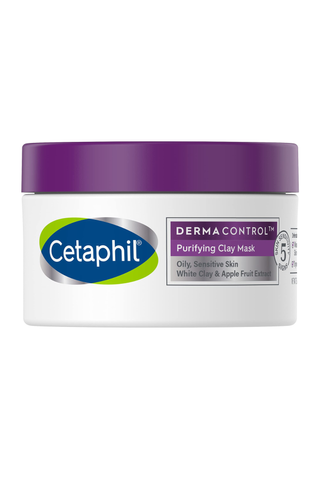
Cetaphil knows a thing or five about sensitive skin. Seriously, they kind of have a trademark on the whole non-irritating thing. So rest assured when developing a detoxifying clay mask, they were going to do so in a way that doesn't strip the skin. “This contains additional moisturizers like glycerin, petrolatum, shea butter, and avocado oil to keep skin moisturized,” points out Dr. Kazlouskaya. There’s also apple fruit extract in the mix to provide gentle exfoliation and get rid of any dead skin cells, dry spots, or rough patches.
Pros: Derm-approved; Hydrating; Affordable
Cons: Stronger options for non-sensitive skin
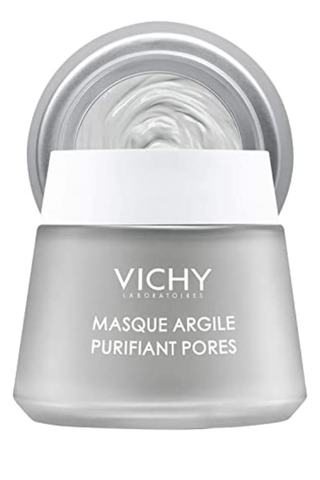
You know those days where you feel like your skin just hates you? Yea, same. Maybe your redness is acting up, maybe your acne is feeling particularly vengeful, or maybe it’s just all out of whack with the season’s change. Regardless, this is a skin-balancing savior. “Vichy’s clay mask is formulated with volcanic water that was proven to strengthen skin barrier function,” explains Dr. Kazlouskaya. “It additionally contains aloe vera to soothe the skin.” Pair a healthy and strong skin barrier with the calming effect and your skin will be in a happier, less inflamed state after one use.
Pros: Derm-approved; Affordable; Soothing
Cons: Slight scent; Hard to wash off
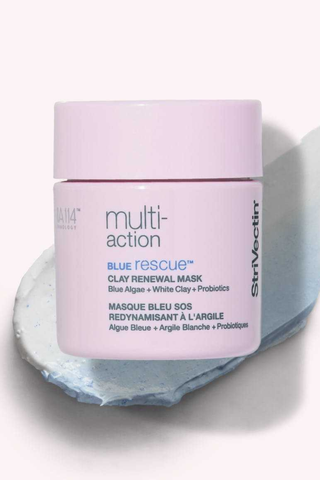
Detoxing the skin is the main goal—that’s obvious. But this specific clay mask has loads of other benefits. As Dr. Kazlouskaya explains, the blue algae, which transforms into a blue shade once it’s massaged in, is able to amp up radiance, soothe the skin, and even reduce the appearance of fine lines. So far, so good, right? Still, there’s more to love about this fun-to-apply product. Red seaweed hydrates the skin and locks in moisture, which is in large part why this mask won’t leave your skin feeling tight, dry, or itchy after use.
Pros: Derm-approved; Hydrating; Anti-aging
Cons: Contains fragrance
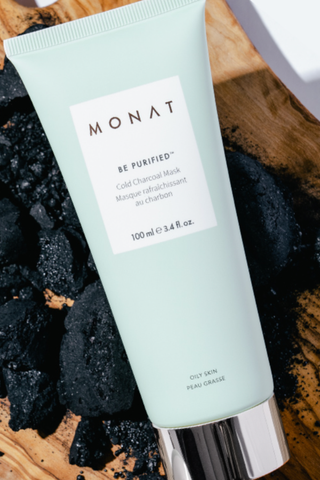
"In selecting a blackhead removal mask, I recommend choosing one that has an alpha or beta hydroxy acid like Monat’s Cold Charcoal Mask," explains Dr. Mack. "This mask is infused with mineral-rich clays, charcoal, and salicylic acid. It gently helps to unclog pores and has an instant mattifying effect." The standout feature? This clay mask gives a refreshing cooling sensation as it works.
Pros: Great for blackheads; Mattifying
Cons: Drying for some
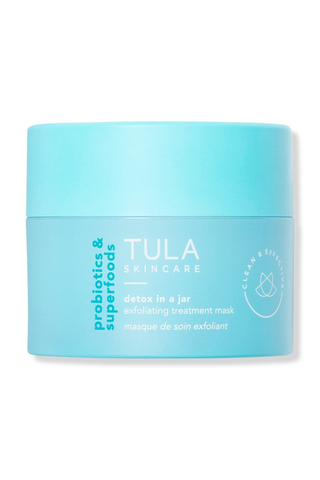
If you want to target clogged pores, oil, and rough texture all with one product, this pretty blue jar should be your go-to. "Tula’s Exfoliating Treatment Mask has lactic acid and bentonite clay," notes Dr. Mack. "Lactic acid, a milk derivative, helps to subtly exfoliate the skin, while the bentonite clay helps to remove impurities from the skin, leaving the skin looking brighter and less congested." Rice extract is also in the mix to smooth out skin texture.
Pros: Balancing; Improves texture
Cons: Messy to use
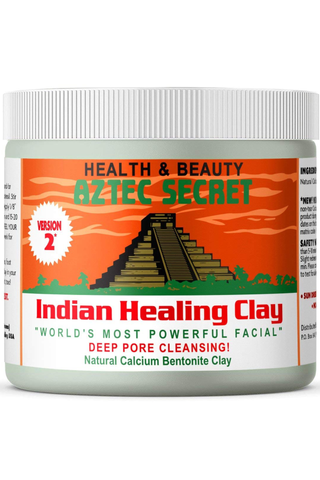
With over 12,000 five-star reviews on Amazon, you can be confident that this mask is the real deal. It’s a no-frills option that delivers results. With just one ingredient, natural calcium bentonite clay, it’s able to powerfully clear out clogged pores and control oil. All you have to do is mix the powder with equal parts apple cider vinegar and you’re good to go. Feel free to apply it to your face, or, if you’re feeling wild and crazy, use it for a clay bath, a foot soak, or even to soothe a bug bite.
Pros: Affordable; Multi-purpose
Cons: Too drying for some
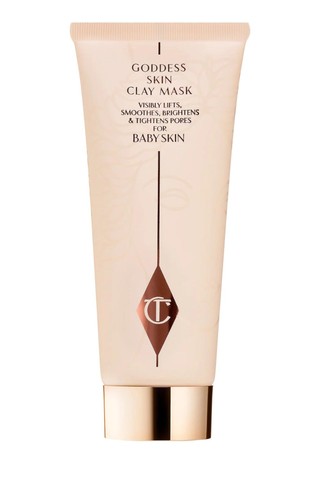
If Charlotte Tilbury knows how to do one thing, it’s how to make skin glow. And sure, Flawless Filter and highlighters galore can amp things up, but real radiance starts with skincare—and this clay mask can’t be beat. It uses Spanish clay to draw out oil and dirt, but is largely focused on restoring hydration, softening the skin, and boosting collagen and elastin production. Just use a thin layer, leave it on for 10 minutes, and rinse off with warm water. Trust me: You’ll be amazed by the results.
Pros: Hydrating; De-puffing; Glow-boosting
Cons: Fragranced
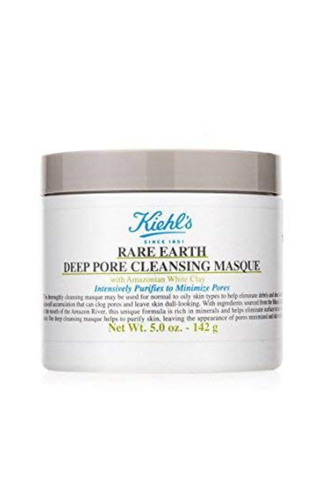
If you’ve thrown every acne-fighting mask at your face in an effort to get rid of blackheads and have little to no progress, I challenge you to give this powerful face mask a go. Powered by Amazonian white clay, this insanely effective product absorbs extra oil and sucks gunk out of pores in just about 10 minutes. Once it’s washed off, you’ll be left with a matte complexion (no oil in sight, I promise), smaller, tighter-looking pores, and noticeably fewer blackheads.
Pros: Great for blackheads; Mattifying
Cons: Some say it’s irritating
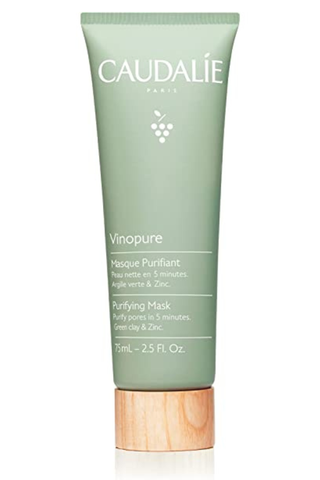
While you can’t *technically* shrink your pores (they are what they are), you can make them look a lot smaller by cleaning out all the dead skin cells and dirt clogging ‘em up. That’s exactly what this clay mask from Caudalie sets out to do. It uses grape seed polyphenols to limit oil production clay to soak up gunk, and caffeine to give a boost of brightness. Once all is said and done, you’ll be left with a complexion that looks and feels brighter and cleaner.
Pros: Good for pores; Vegan
Cons: Expensive
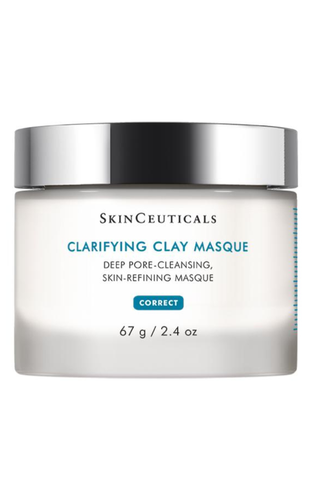
This option is an exfoliating one-two punch. A blend of five fruit acids (malic, lactic, tartaric, citric, and glycolic) gently dissolves dead skin cells and buffs away rough patches to leave a polished, smooth complexion—and help reduce acne. At the same time kaolin and bentonite clays get to work clarifying, reducing oil production, and decongesting pores. Because that whole situation can definitely be a little drying, the derm-developed product also includes soothing and hydrating agents like aloe and chamomile.
Pros: Exfoliating; Good for acne
Cons: Expensive
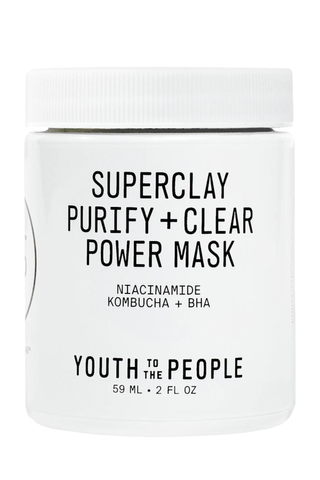
Niacinamide is easily one of the best skincare ingredients out there. Why, you ask? It just does so freaking much. It reduces the size of pores, helps keep acne under control, treats hyperpigmentation, regulates oil—I could go on. That in mind, it’s no surprise that this niacinamide-packed face mask ended up on the list. It takes alllll the aforementioned benefits of niacinamide, plus the exfoliating powers of beta-hydroxy acids and the deep cleansing properties of kaolin clay to create the MVP of clay masks.
Pros: Multi-benefit; Treats acne
Cons: Drying
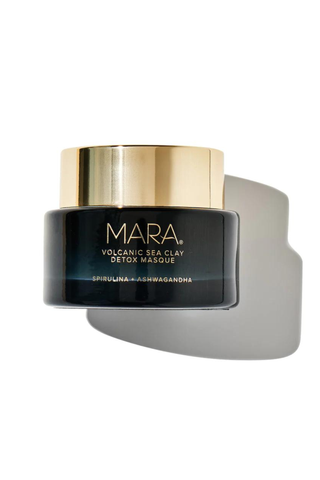
This guy contains the usual suspects: Kaolin clay and bentonite. But there’s also some interesting ingredients thrown into the mix. First up? Volcanic ash from Jeju island in South Korea. Not only is that just generally cool, but it also serves a purpose—the ash is made of enzymes that fight acne, absorb oil, and tighten the skin. Next in line? Algae, which is nutrient-packed and refreshes the skin. Then, last but certainly not least, is a slew of adaptogens that soothe stressed-out skin.
Pros: Fights acne; Tightens skin
Cons: Slight scent
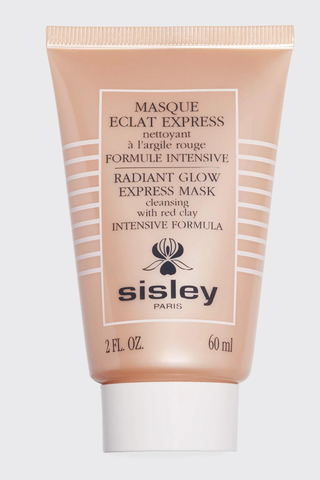
If you can’t seem to get behind the tightening feeling that comes along with most clay masks, but still want the benefits, reach for this luxury option. Thanks to red clay, a blend of essential oils, and plant extracts, the creamy mask is going to detox your complexion without pulling on the skin. It’s also going to deliver benefits in about half the time—just wash it off in five minutes to reveal glowing skin.
Pros: Good for sensitive skin; Gentle
Cons: Expensive
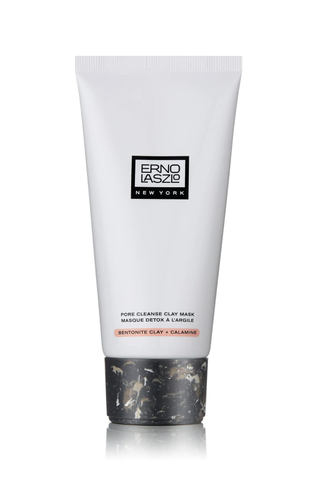
While pimples are much more common among oily skin types, that doesn't mean that those with dry and sensitive skin don’t need a deep clean—pore-clogging debris don't discriminate. If you fall into the latter category, Erno Laszlo has your back. In addition to bentonite and kaolin clay, this detoxifying mask is packed with calamine, a mixture of zinc oxide and iron oxide, and a proprietary moisturizing complex. Together, they’re able to calm and soothe the skin for an irritation-free deep clean.
Pros: Gentle; Calming
Cons: Expensive
Meet the Dermatologists

Viktoryia Kazlouskaya, MD, PhD, is certified in dermatopathology and dermatology by the American Board of Dermatology. She practices at University of Pittsburgh Physicians, Department of Dermatology, Division of Dermatopathology and is affiliated with UPMC Presbyterian, UPMC Altoona, UPMC Shadyside, and UPMC Magee-Womens Hospital. She completed her medical degree and residency at Vitebsk State Medical University, followed by a residency at SUNY Downstate Medical Center and a fellowship at University of Pittsburgh School of Medicine.

Lian Mack, MD is a board certified dermatologist committed to excellence in comprehensive dermatological care. She holds a special interest in skin conditions as it applies to skin of color, as well as all aspects of aesthetic enhancements including neurotoxins, injectable fillers, and laser treatments. She has achieved a Master Injector Certification from Allergan, the largest makers of dermal fillers and Botox. Dr. Mack graduated magna cum laude from Columbia University, Columbia College in the City of New York. She continued her postgraduate studies at Weill Cornell Medical College, during which she did a one-year research fellowship in melanoma research at the NYU School of Medicine. After a one-year internship at New York Hospital, she went on to complete her residency in Dermatology at St. Luke’s – Roosevelt Hospital Center where she served as Chief resident during her final year. Prior to GlamDerm, Dr. Mack worked in Chelsea alongside her mentor Dr. Michael Eidelman. Currently, she volunteers as an Assistant Professor of Clinical Dermatology at Mt. Sinai Medical Center. Dr. Mack has authored numerous peer reviewed journal articles and book chapters. She is a fellow of the American Academy of Dermatology, and a member of several professional societies including the American Society for Dermatologic Surgery, and has actively served as a member and on the board of the Women’s Dermatologic Society.
Stay In The Know
Marie Claire email subscribers get intel on fashion and beauty trends, hot-off-the-press celebrity news, and more. Sign up here.

Samantha Holender is the Beauty Editor at Marie Claire, where she reports on the best new launches, dives into the science behind skincare, and keeps up with the latest trends in the beauty space. She has previously written for Us Weekly, Popsugar, Makeup.com, Skincare.com, and Philadelphia Wedding. Follow her on Instagram @samholender.
-
 Jennifer Lopez Clearly Prefers This Comeback Sneaker Trend
Jennifer Lopez Clearly Prefers This Comeback Sneaker TrendShe's wearing it as often as her favorite Birkin bags.
By Julia Gray Published
-
 Olivia Rodrigo Is Bringing Visible Bra Straps Back
Olivia Rodrigo Is Bringing Visible Bra Straps BackThe pop-punk princess wore custom Victoria's Secret at Coachella.
By Julia Gray Published
-
 Meghan Markle’s New Netflix Cookery Show Begins Filming Today—But Not Where You’d Expect It to Be Shot
Meghan Markle’s New Netflix Cookery Show Begins Filming Today—But Not Where You’d Expect It to Be ShotThe Sussexes are having a busy week this week, shooting both of their his-and-her Netflix shows and rolling out the first product offering for Meghan’s new lifestyle brand American Riviera Orchard.
By Rachel Burchfield Published
-
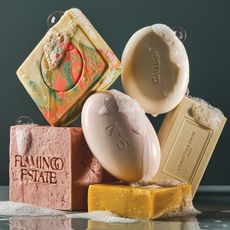 The Bar Soap Boom Is Here
The Bar Soap Boom Is HereDespite endless body wash options, the art of luxury soap making hasn't slipped away.
By Sophia Vilensky Published
-
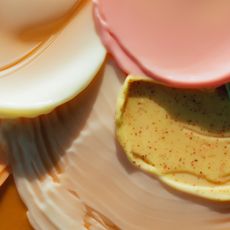 The 13 Best Products for Rosacea That Fight Redness and Irritation
The 13 Best Products for Rosacea That Fight Redness and IrritationFlare-ups are a thing of the past.
By Samantha Holender Published
-
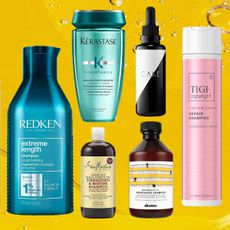 The 32 Best Hair Growth Shampoos of 2024, According to Experts
The 32 Best Hair Growth Shampoos of 2024, According to ExpertsRapunzel hair, coming right up.
By Gabrielle Ulubay Published
-
 The 20 Best Hair Masks for Damaged Hair, According to Experts and Editors
The 20 Best Hair Masks for Damaged Hair, According to Experts and EditorsHealthy strands, here we come!
By Gabrielle Ulubay Last updated
-
 Selena Gomez Just Shared Her Entire Morning Skincare Routine on TikTok
Selena Gomez Just Shared Her Entire Morning Skincare Routine on TikTokThe most giving girlie.
By Iris Goldsztajn Published
-
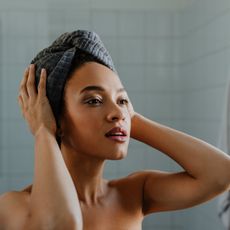 How Often You Should Wash Your Hair, According To Experts
How Often You Should Wash Your Hair, According To ExpertsKeep it fresh, my friends.
By Gabrielle Ulubay Published
-
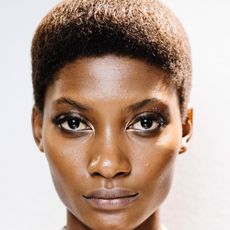 The 11 Best Magnetic Lashes of 2023
The 11 Best Magnetic Lashes of 2023Go ahead and kiss your messy lash glue goodbye.
By Hana Hong Published
-
 Beauty Advent Calendars Make the Perfect Holiday Gift
Beauty Advent Calendars Make the Perfect Holiday GiftThe gift that keeps on giving.
By Julia Marzovilla Last updated